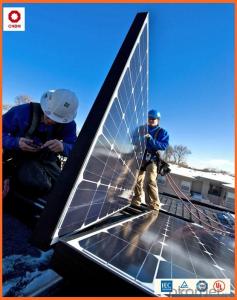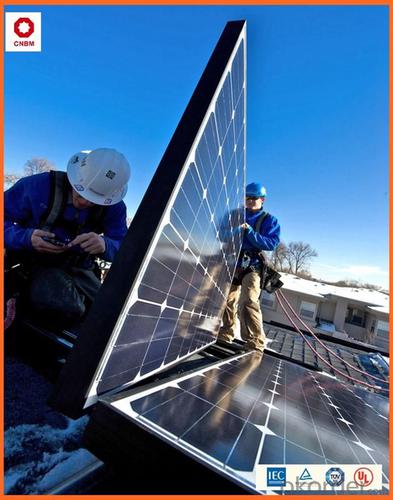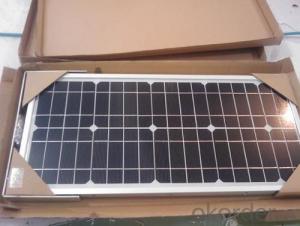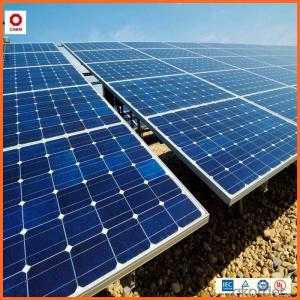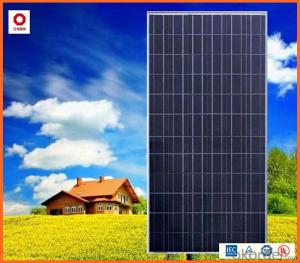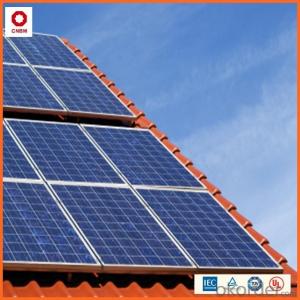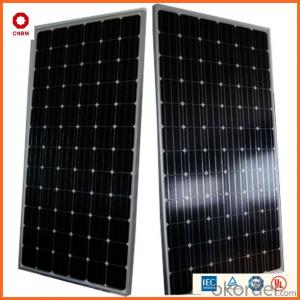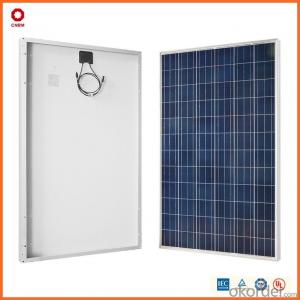Heliocol 200w Polycrystalline Silicon Solar Module with CE/IEC/TUV/ISO Approval Standard Solar
- Loading Port:
- Nanjing
- Payment Terms:
- TT OR LC
- Min Order Qty:
- 100 watt
- Supply Capability:
- 1000000 watt/month
OKorder Service Pledge
OKorder Financial Service
You Might Also Like
Specification
Solar 200W Polycrystalline Silicon Solar Module With CE/IEC/TUV/ISO Approval Standard Solar
CNBM International Corporation is a professional solar panel manufacturer in China for CNBM brand . Silicon panel ( silicon module), as our main product, has high quality and good service. Our products are very popular in Europe, Australia, England, Middle East, Mexico, Argentina, Chili, Singapore and Africa.
Furthermore, our products have gained international authorized certificates like TUV, UL and CE.
China National Building Material (Group) Corporation (CNBM), established in 1984, is one of the largest State-owned group corporations of building & mechanical materials which specializes in the design, manufacturing and distribution of building materials in the world.
As the whole world turns “green”, CNBM enters into the Photovoltaic Industry in 2005.After 6 years' fast growth, now our annual capacity is 500MW solar panel and 500MW solar cell.
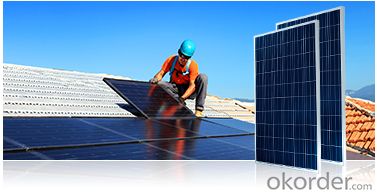
We now provide
• Monocrystalline Solar Panel
• Polycrystalline Solar Panel( multicrystalline silicon Solar Panel)
Features of our products:
Long lifespan: 25Years lifetime guarantee, 12years workshop warranty. 90% output in first 10years. 85% output in next 15years.If module fail during warranty period, please contact local dealer, and provide the warranty card to replace the products.
Solar panels are withstand extreme working condition (from -40°C to 120°C)
Grade A solar panels rated by TUV.
High transformation efficiency solar panels
New UV reflector protected Layer
Maintenance free solar panels
No exposed metal parts
Custom-made available
100% EL TEST before and after laminator for each solar panels
TUV,MCS,CEC,IEC61215,IEC61730,CE,UL approved solar panels
CHUBB insurance company to guarantee the quality of solar panels
Bankable solar panels in German,Italy,UK,Denmark country
As a professional Solar Panel manufacturer and Supplier in China, we have our customers come around the whole world and our specialization has got a worldwide recognition. Meanwhile, with our superior quality, competitive price, prompt and excellent service, As main role in trade section of CNBM Group, CNBM International Corporation supplies products including Monocrystalline Solar Panel, Polycrystalline Solar Panel ( multicrystalline silicon Solar Panel) have received and enjoyed famous reputation in many countries and regions in the world.
- Q: The voltage and power problems of solar panels
- 3, charge 12V battery when the power is really small, if it is a normal controller, then the equivalent of 18V voltage in the charge, probably 18 x (240 / 30.2) = 143w solar panels.
- Q: Please, I want a good definition. :DD
- The previous answer stating that a solar panel is a method of collecting, and converting sunlight into electricity is correct, however once sunlight has been converted into electricity, it has to have a way to be stored, so that it can be used. This is accomplished by the use of storage batteries. It is stored in a DC or Direct Current form, and may then be converted to AC (alternating current) through the use of an inverter.
- Q: I want to build solar panels for my house.Dose anyone try okorder is this really work?
- |Its okorder /
- Q: I have had this 2v portable Solar Panel for my apartment for awhile. Only problem is that I have no balcony and I can barely get enough sun to use it with my Cobra 450 400-800 watt outlet converter. Can someone advise me a better method to use these? Like do I have to get more 2v solar panels? I have a small apartment and use it on one window. Also is it possible for me to buy a portable storage tank to store the energy gathered from the sun by the solar panel?
- Your portable panel is at most a few amps at 2 volts nominal.Hopefully you have a higher voltage than this to enable you to charge a 2 volt battery. This takes about 3.3-3.6 volts. Your converter will function until a battery reaches about 0.5 volts (drop out voltages vary greatly). A deep discharge marine batttery will be the best bet for storage but usually more expensive than a regular battery. If your resources are limited, you might try from these cheaper sources. Insterstate battery stores usually have blems at a lower price. These are totally functional batteries but have surface imperfections that the manufacturer doesn't want his name on. Also check you local junkyard or towing service. They are often asked by insurance carriers to junk a car which has been wrecked. Many times the batteries are still perfect. They sell these for what they can get for them. Look for one from a SUV with lots of power options. Often kids cars have outlandish stereo systems requiring heaavy current batteries. These are a good find. Consider getting a solar power management system for charging your system. It will limit your charging voltage so you do not float a 2 volt battery above 4 volts where it would slowly destroy it.
- Q: Dear Friends, I am very much worried about Global warming, So to contribute something for reducing Global Warming I have decided to use Solar Panels. Can anybody tell me what is the price of these Solar Panels and why people are not using them when they are environment friendly. What are the Pros and Cons of these Solar Panels?
- A 35 Watt Solar Panel cost between 400 and 500 depending on where you make the deal. I live full time in an RV and I get all my electric from the Sun. I am sold on solar but I move around to places, according to the season, where I will have full sun most of the time. I also have a small generator as a back up but rarely use it. The amount of direct sun and angle of the panels will determine how efficient they are. For some one living in an apartment with only a few hours of sun then solar would not be good for them.
- Q: Are the solar panels on the roof just a gimik to get all the tree huggers to buy it, or are they actually a good, efficent design?
- treehuggers already want priuses. the solar panel is meant to run an electric ac system that cool's the prius if the car gets too hot inside. its nice, but personaly, i'd rather have it charge the battery.
- Q: How do solar panels impact the environment?
- Solar panels have a positive impact on the environment as they generate clean, renewable energy without emitting harmful greenhouse gases or pollutants. They help reduce reliance on fossil fuels, decrease air and water pollution, and combat climate change, making them a sustainable and environmentally friendly choice for energy production.
- Q: How do solar panels affect the roof's structure and integrity?
- Solar panels can have some impact on the roof's structure and integrity, but they are designed to be lightweight and installed without compromising the roof's stability. Properly installed solar panels distribute the weight evenly, reducing the likelihood of any structural damage. Additionally, solar panels can help protect the roof by shielding it from the elements, potentially extending its lifespan. However, it is crucial to consult with a professional to ensure proper installation and minimize any potential impact on the roof.
- Q: Do solar panels increase property value?
- Yes, solar panels have been found to increase property value. Studies have shown that homes with solar panels tend to sell at a higher price and faster than those without. Additionally, the potential for reduced energy bills and the positive environmental impact of solar energy can make a property more attractive to potential buyers, thus increasing its overall value.
- Q: My plans are building several solar panels and have a battery bank. I want to be able to power the refriderator and freezer and occationaly an electric grill. How would This work exactly and what would the best way to hook this up to make it work? I want to be able to convert DC to AC. How many batterys would I need to make this work. I know when Civil unrest happens I want to be prepared. How would Wind Power work If I can get the equipment I need?
- lets find out
Send your message to us
Heliocol 200w Polycrystalline Silicon Solar Module with CE/IEC/TUV/ISO Approval Standard Solar
- Loading Port:
- Nanjing
- Payment Terms:
- TT OR LC
- Min Order Qty:
- 100 watt
- Supply Capability:
- 1000000 watt/month
OKorder Service Pledge
OKorder Financial Service
Similar products
Hot products
Hot Searches
Related keywords
